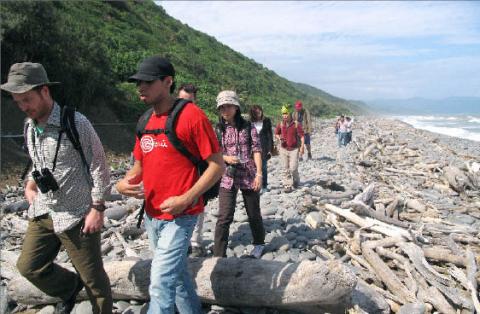Four environmental specialists who participated in the 10th Asia-Pacific NGO Environmental Conference in Taipei visited the historical Alangyi Trail (阿朗壹古道) yesterday and met Pingtung County Commissioner Tsao Chi-hung (曹啟鴻) to share ideas on protecting the trail.
The tour followed on the international NGO conference hosted by the Society of Wilderness which ended on Monday.
The Alangyi Trail, a 12km hiking trail along the Pacific coastline between Taitung County’s Nantian Village (南田) and Pingtung County’s Syuhai Village (旭海), is being threatened by the planned construction of Provincial Highway No. 26. A section of the planned highway would run alongside the trail.

Photo: Tsai Tsung-hsien, Taipei Times
The group of specialists started walking at Nantian and headed south on the pristine trail, passing through the mouth of a stream and walking along the shore covered with round rocks and driftwood, while environmental tour guides from local NGOs explained the ecological features.
Holding a live tree crab in his hands, a tour guide said more than 1,000 crabs per night would cross the trail during breeding season.
After a walk of about 2km along the trail, the group met Tsao at the Pingtung County Hall to share their experiences.
Chairperson of the Asia-Pacific Environmental Council and professor at Tokyo Keizai University, Yayoi Isono, said she loved walking along the ancient trial. She added that it was a beautiful place with many natural resources and hoped the government would protect the area.
A reserve manager at the World Wide Fund for Nature in Hong Kong, Bena Smith, said rather than always opposing construction, NGOs should provide alternatives and reach compromises with developers or the government.
Pierre Fidenci, founder and president of Endangered Species International, said the matter reminded him of a case in southern France, where activists spent a few years stopping the construction of a highway.
He said tourism was very important in France and that the people and government had gradually learned that “tourism is not only about convenient transportation, but also preserving the beautiful landscape the way it is” and “making it unique can also increase the number of tourists over the years.”
Stuart Rosewarne, of the department of political economy at the University of Sydney, emphasized that the importance of developing eco-tourism is not to over-develop areas, but to educate tourists to be environmentally aware.
Tsao said the nature reserve’s resources and landscape are precious assets, but the government faces heavy pressure from local residents to build the highway. This is because they were taught that transportation is the most important aspect of tourism and improving their lives, and do not fully understand the benefits of keeping the area pristine.
“When we want to protect a natural attraction [in Japan], it is also hard to have dialogue with the local people, because some of them want economic development or convenient transportation,” Isono said.
“If that is the case, how to promote dialogue between the government, NGOs and local people should be considered when making plans [for development].”

Alain Robert, known as the "French Spider-Man," praised Alex Honnold as exceptionally well-prepared after the US climber completed a free solo ascent of Taipei 101 yesterday. Robert said Honnold's ascent of the 508m-tall skyscraper in just more than one-and-a-half hours without using safety ropes or equipment was a remarkable achievement. "This is my life," he said in an interview conducted in French, adding that he liked the feeling of being "on the edge of danger." The 63-year-old Frenchman climbed Taipei 101 using ropes in December 2004, taking about four hours to reach the top. On a one-to-10 scale of difficulty, Robert said Taipei 101

Nipah virus infection is to be officially listed as a category 5 notifiable infectious disease in Taiwan in March, while clinical treatment guidelines are being formulated, the Centers for Disease Control (CDC) said yesterday. With Nipah infections being reported in other countries and considering its relatively high fatality rate, the centers on Jan. 16 announced that it would be listed as a notifiable infectious disease to bolster the nation’s systematic early warning system and increase public awareness, the CDC said. Bangladesh reported four fatal cases last year in separate districts, with three linked to raw date palm sap consumption, CDC Epidemic Intelligence

US climber Alex Honnold left Taiwan this morning a day after completing a free-solo ascent of Taipei 101, a feat that drew cheers from onlookers and gained widespread international attention. Honnold yesterday scaled the 101-story skyscraper without a rope or safety harness. The climb — the highest urban free-solo ascent ever attempted — took just more than 90 minutes and was streamed live on Netflix. It was covered by major international news outlets including CNN, the New York Times, the Guardian and the Wall Street Journal. As Honnold prepared to leave Taiwan today, he attracted a crowd when he and his wife, Sanni,

Taiwanese and US defense groups are collaborating to introduce deployable, semi-autonomous manufacturing systems for drones and components in a boost to the nation’s supply chain resilience. Taiwan’s G-Tech Optroelectronics Corp subsidiary GTOC and the US’ Aerkomm Inc on Friday announced an agreement with fellow US-based Firestorm Lab to adopt the latter’s xCell, a technology featuring 3D printers fitted in 6.1m container units. The systems enable aerial platforms and parts to be produced in high volumes from dispersed nodes capable of rapid redeployment, to minimize the risk of enemy strikes and to meet field requirements, they said. Firestorm chief technology officer Ian Muceus said